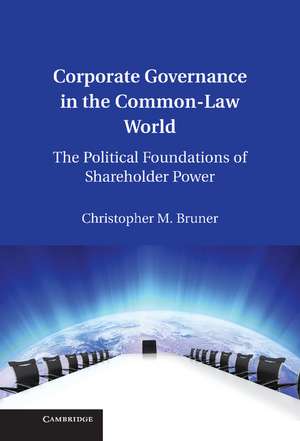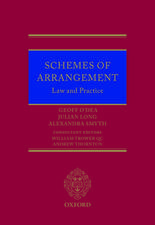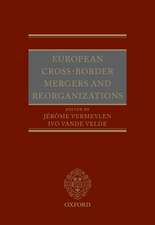Corporate Governance in the Common-Law World: The Political Foundations of Shareholder Power
Autor Christopher M. Bruneren Limba Engleză Hardback – 28 mar 2013
| Toate formatele și edițiile | Preț | Express |
|---|---|---|
| Paperback (1) | 287.11 lei 6-8 săpt. | |
| Cambridge University Press – 29 oct 2014 | 287.11 lei 6-8 săpt. | |
| Hardback (1) | 462.21 lei 6-8 săpt. | |
| Cambridge University Press – 28 mar 2013 | 462.21 lei 6-8 săpt. |
Preț: 462.21 lei
Preț vechi: 519.34 lei
-11% Nou
Puncte Express: 693
Preț estimativ în valută:
88.47€ • 92.88$ • 73.08£
88.47€ • 92.88$ • 73.08£
Carte tipărită la comandă
Livrare economică 30 ianuarie-13 februarie 25
Preluare comenzi: 021 569.72.76
Specificații
ISBN-13: 9781107013292
ISBN-10: 1107013291
Pagini: 318
Ilustrații: 9 b/w illus.
Dimensiuni: 152 x 229 x 19 mm
Greutate: 0.54 kg
Ediția:New.
Editura: Cambridge University Press
Colecția Cambridge University Press
Locul publicării:New York, United States
ISBN-10: 1107013291
Pagini: 318
Ilustrații: 9 b/w illus.
Dimensiuni: 152 x 229 x 19 mm
Greutate: 0.54 kg
Ediția:New.
Editura: Cambridge University Press
Colecția Cambridge University Press
Locul publicării:New York, United States
Cuprins
Part I. Shareholder Orientation in the Common-Law World: 1. Introduction and overview; 2. Comparative theory and corporate governance; 3. The corporate governance role of shareholders in common-law jurisdictions; Part II. A Political Theory of Corporate Governance in the Common-Law World: 4. Comparative theories of corporate governance; 5. Shareholders, stakeholders, and social welfare policy; Part III. The Theory's Explanatory Domain: 6. Stability, change, and the future of corporate governance in the common-law world.
Recenzii
'… Bruner's insights are a revelation … [H]e has identified a critical, new dimension of our understanding of corporate law.' David Skeel, Texas Law Review
'[T]his book is a work of monumental significance and scholarly craft. It is impeccably researched, beautifully written, and its claims are both forceful and highly persuasive. It is an absolute must for anyone seeking to form a holistic understanding of how corporate law and governance relate to their broader social-institutional context, as well as an excellent primer on the key comparative features of the world's principal common law systems. In writing this pioneering work, Bruner has undoubtedly earned the right to sit at the very top table of international corporate law scholarship. One can only hope that future research in the field will advance this fascinating line of enquiry yet further.' Marc Moore, The Cambridge Law Journal
'[The book] does a great service in expanding and deepening the debate over the nature of corporate governance … By drawing a connection between corporate law and labor and employment law, Bruner has expanded the scope of 'the law of the firm', for lack of a better term, to include not just shareholders, boards, and top-level executives, but rather all the participants in the firm, especially employees.' Matthew Bodie, PrawfsBlawg blog (prawfsblawg.blogs.com)
'Bruner powerfully explodes the analytical categories of the 'common law countries' and 'liberal market economies' by analyzing at length and in depth the substantial legal and political economic differences across these nations … I am unaware of a comparably sustained and in-depth comparative treatment of corporate and economic governance in the common law countries that so clearly articulates the systemic significance of the differences across them.' John Cioffi, PrawfsBlawg blog (prawfsblawg.blogs.com)
'Christopher Bruner is to be commended for his thorough survey of corporate governance theories and the wealth of historical information about the socio-political circumstances surrounding the formation of each of the four common-law countries' governance regimes. Bruner's explanation and historical analysis of the pivotal position of labor is an original lens through which to examine corporate governance in common-law countries … Without doubt, Corporate Governance in the Common-Law World is a highly commendable work and provides an excellent counterpart for further empirical investigation.' Anita Anand and William Muir, Business Ethics Quarterly
'[T]his book is a work of monumental significance and scholarly craft. It is impeccably researched, beautifully written, and its claims are both forceful and highly persuasive. It is an absolute must for anyone seeking to form a holistic understanding of how corporate law and governance relate to their broader social-institutional context, as well as an excellent primer on the key comparative features of the world's principal common law systems. In writing this pioneering work, Bruner has undoubtedly earned the right to sit at the very top table of international corporate law scholarship. One can only hope that future research in the field will advance this fascinating line of enquiry yet further.' Marc Moore, The Cambridge Law Journal
'[The book] does a great service in expanding and deepening the debate over the nature of corporate governance … By drawing a connection between corporate law and labor and employment law, Bruner has expanded the scope of 'the law of the firm', for lack of a better term, to include not just shareholders, boards, and top-level executives, but rather all the participants in the firm, especially employees.' Matthew Bodie, PrawfsBlawg blog (prawfsblawg.blogs.com)
'Bruner powerfully explodes the analytical categories of the 'common law countries' and 'liberal market economies' by analyzing at length and in depth the substantial legal and political economic differences across these nations … I am unaware of a comparably sustained and in-depth comparative treatment of corporate and economic governance in the common law countries that so clearly articulates the systemic significance of the differences across them.' John Cioffi, PrawfsBlawg blog (prawfsblawg.blogs.com)
'Christopher Bruner is to be commended for his thorough survey of corporate governance theories and the wealth of historical information about the socio-political circumstances surrounding the formation of each of the four common-law countries' governance regimes. Bruner's explanation and historical analysis of the pivotal position of labor is an original lens through which to examine corporate governance in common-law countries … Without doubt, Corporate Governance in the Common-Law World is a highly commendable work and provides an excellent counterpart for further empirical investigation.' Anita Anand and William Muir, Business Ethics Quarterly
Notă biografică
Descriere
Presents a new comparative theory to explain the divergence between governance systems of Australia, Canada, the United Kingdom and the United States.







